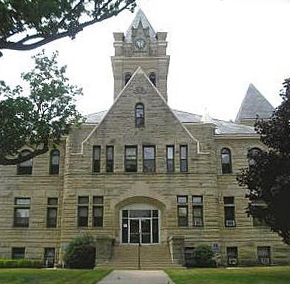 The Pulaski County Coroner’s Office continues to explore the possibility of charging for copies of certain reports. Coroner John Behny and Chief Deputy Jon Frain presented a few fee collection options to the county council and commissioners last week. “We’re talking about the autopsy report, the toxicology report, the coroner’s summary, or the coroner’s verdict,” Frain explained. “And because of the Indiana public access laws and through public release of information, there are certain things we have to release and then there’s certain things that we don’t. . . . You guys have the authority to charge a fee or not.”
The Pulaski County Coroner’s Office continues to explore the possibility of charging for copies of certain reports. Coroner John Behny and Chief Deputy Jon Frain presented a few fee collection options to the county council and commissioners last week. “We’re talking about the autopsy report, the toxicology report, the coroner’s summary, or the coroner’s verdict,” Frain explained. “And because of the Indiana public access laws and through public release of information, there are certain things we have to release and then there’s certain things that we don’t. . . . You guys have the authority to charge a fee or not.”
They said that a person’s next of kin would continue to get one copy for free, but the county could charge for additional ones. Other than family members, Behny said insurance companies and attorneys are typically the ones who would be making the requests. He felt that in addition to the bringing in some extra money, charging a fee would also help prevent unauthorized individuals from seeking access. “I like the idea of some sort of accountability on the other end,” Behny said. “We have to be careful. You can claim to be whoever you are, for asking for death certificates and so forth. There’s a lot of people out there with not-so-great motives wanting to get their hands on some of this information.”
Behny and Frain said it’s difficult to recommend a specific fee, since other counties have a wide range and insurance companies are typically willing to pay $15 to $300. Council member Mike Tiede suggested charging $100 for each copy beyond the initial one given to the family. But his motion died for a lack of a second, as council members wanted to review the proposal with County Attorney Kevin Tankersley.
At the same time, Frain wants to implement a more formal system for disposition permits. That would require the Coroner’s Office to be notified before a body is cremated.
The hope is that the system would help increase communication before remains are destroyed. For example, Frain said there are times when a health care facility releases a body, but its doctors aren’t willing to sign the death certificate. “They can’t release the body from a hospital or the nursing home, unless there’s a doctor,” Frain said. “But what happens is they release the body – I’m telling you what actually happens – and then the doctor that said that they would won’t do it. This happens. I have people I serve all over the county. And so they say, ‘Oh, call the coroner.’ That’s too late. The coroner can’t go to the funeral home and look at the body.”
Frain added that the county council may choose to charge a fee for cremation permits. County officials plan to revisit the fee proposals at the next joint council and commissioners meeting in August.
Frain and Behny also reported that they’ve been invited to serve on the Indiana Violent Death Registry Board and the Coroners’ Council on Indiana Organ Procurement. As part of that, the commissioners voted to allow the Coroner’s Office to enter into a data-sharing agreement with the Violent Death Registry Board.

















